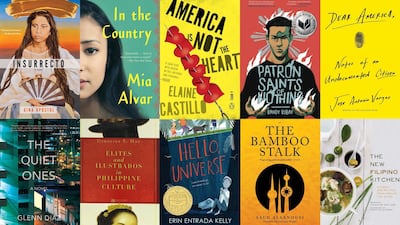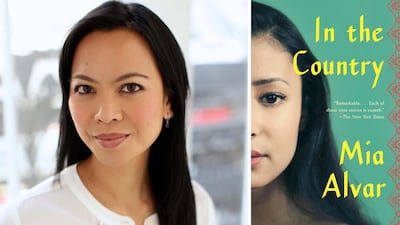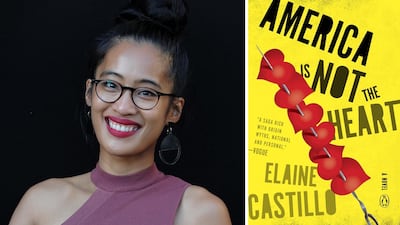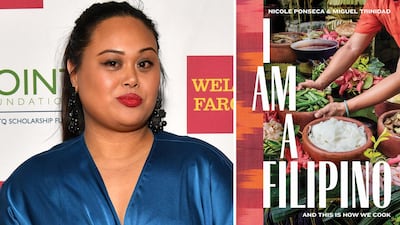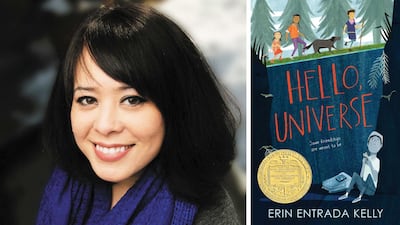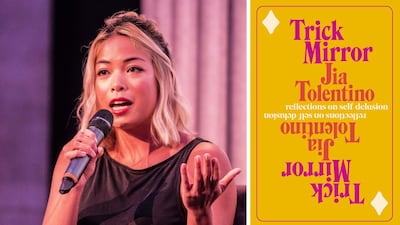A recent explosion of migrant Filipino literature has called attention to the transnational identities, geopolitical diversity and profound issues engendered by its diaspora.
Here is our selection of the best — new or fairly recent — books about the Philippines and contemporary migrant Filipino experiences from across the globe. We’ve also included picks for children, young adult readers and culinary enthusiasts.
Insurrecto
By Gina Apostol
2018
Two women, a Filipina translator and an American filmmaker, set out to visit the Philippines to write two competing movie scripts chronicling the sordid history of Philippine-US relations.
Ingeniously structured through several non-linear and intersecting storylines, Insurrecto unsettles our understanding of the complex, hybrid identities engendered by imperialism. The book is also wickedly funny. Apostol grew up in the Philippine city of Tacloban and teaches literature at the Ethical Culture Fieldston School in New York City.
In the Country
By Mia Alvar
2015
A collection of nine short stories set in the US and the Middle East, In the Country explores the political power plays and socio- economic inequalities that have driven the diaspora of migrant Filipino workers.
Born in Manila and raised in Bahrain and New York, Alvar writes with utmost care and insight about experiences of longing and displacement. Her prose also elegantly relates how migrants travel across borders, their experiences ultimately transforming their discernment of the meaning of home.
America Is Not the Heart
By Elaine Castillo
2019
This multi- generational family saga offers a fascinating portrait of the injustices of an immigrant living in California during the 1990s. Gracefully lyrical, Castillo uses her debut novel to reflect on the promises of the American dream amid inescapable class, power and race-based struggles in both the Philippines and the US. The title of her book is a reference to Carlos Bulosan’s 1943 novel America is in the Heart, which is a semi- autobiographical work that follows the life of a Filipino immigrant poet.
Patron Saints of Nothing
By Randy Ribay
2019
Born in the Philippines, Ribay crafts an absorbing coming-of-age tale about a Filipino- American teenager. A student in Michigan, Jay travels back to Manila to uncover the truth about his Filipino cousin Jun, who has been murdered as part of President Rodrigo Duterte’s brutal war on drugs.
Riveting and deeply moving, this young adult novel interrogates the dynamics of insider- outsider identity, family, grief and homeland. It was selected as a finalist for the National Book Award for Young People’s Literature.
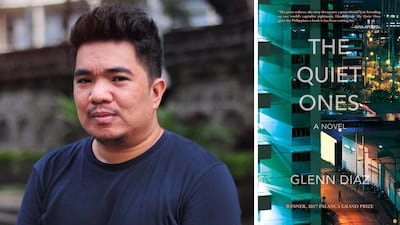
The Quiet Ones
By Glenn Diaz
2017
In this heartbreaking yet fulfilling work, a call centre employee attempts to embezzle money from the US telecommunications company for which he mans the phones.
Yet this heist-thriller plot is merely the start of a haunting take on migrant, cosmopolitan imaginaries stirred up by postcolonial Manila and a globalised, billion-dollar industry. The book won the Palanca Grand Prize and the Philippine National Book Award. Diaz lives in Australia, where he is working on his second novel.
I Am A Filipino: And This Is How We Cook
By Nicole Ponseca and Miguel Trinidad
2018
In this extraordinary cookbook, chefs and restaurateurs Ponseca and Trinidad joyfully showcase modern Filipino recipes that reflect the cuisine’s diverse techniques, influences, tastes and ingredients. Deeply researched, this collection captures the nuances of a multifaceted cuisine influenced by China, Spain, Mexico, the US and the Middle East. The images in the book are a treat, too. Ponseca and Trinidad own and operate Maharlika and Jeepney, beloved Filipino restaurants in New York.
The Bamboo Stalk
By Saud Alsanousi
2012
“With a Filipino face, a Kuwaiti passport, an Arab surname and a Christian first name, will his father’s country welcome him?” The winner of the International Prize for Arabic Fiction in 2013, this book chronicles the identity struggles of Jose, a half-Filipino, half-Kuwaiti teenager who returns to Kuwait to discover his roots and Arab relatives. Kuwaiti journalist Saud Alsanousi examines the ill-treatment faced by domestic workers and children of parents that are unmarried, subjects rarely acknowledged in fiction.

The New Filipino Kitchen: Stories and Recipes from around the Globe
By Jacqueline Chio-Lauri
2018
Here is another culinary anthology worth checking out. Chio-Lauri lives in the UK and has gathered 30 recipes shared by Filipinos living abroad, including White House executive chef Cristeta Comerford.
The recipes appear alongside personal anecdotes and backstories that reference cultural preservation, heritage and syncretic culinary styles. The author has a Gulf connection, too, as Chio-Lauri worked for the Sheraton Grand Hotel in Dubai during the 1990s as a food and beverage manager.
Hello, Universe
By Erin Entrada Kelly
2017
The winner of the John Newbery Medal last year, this children’s novel features a colourful cast of characters, including a Filipino-American boy and a Japanese psychic, who form unexpected friendships along with two others.
Written with irresistible verve, the book gets to grips with issues of self-acceptance and cross-generational relationships. Kelly says she was inspired by her own experiences growing up as the only Asian student in her school in Louisiana, where she was repeatedly bullied by her peers.
Trick Mirror: Reflections on Self-Delusion
By Jia Tolentino
2019
One of this year’s most spectacular debut releases, Trick Mirror features nine essays by Filipino-American cultural critic and New Yorker staff writer Tolentino.
Born in Toronto to migrant Filipino parents, Tolentino recently returned to the Philippines to launch her book and meet a local fan base captivated by her astonishing, but always relatable, reflections on cultural life in the digital age. A New York Times bestseller, Tolentino’s book covers topics such as reality television, pop music and feminism.
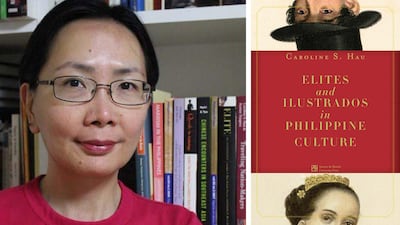
'Elites and Ilustrados in Philippine Culture
By Caroline S. Hau
2018
Published after Duterte was elected president in 2016, this non-fiction book scrutinises the social forces and literary subjects that have redefined politics and culture in the Philippines.
A professor at Kyoto University, Hau is also the author of the historical monograph Necessary Fictions: Philippine Literature and the Nation, 1946-1980, published in 2000, which deftly examines the relations between literature and nationalist discourse in the Philippines during the postwar period.
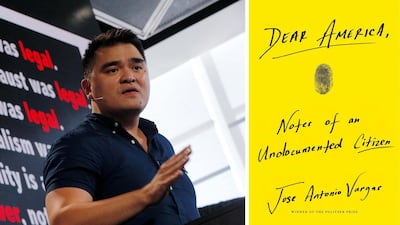
Dear America: Notes of an Undocumented Citizen
By Jose Antonio Vargas
2018
“After 25 years of living illegally in a country that does not consider me one of its own, this book is the closest thing I have to freedom,” Vargas writes in his powerful memoir. He reflects on the sense of “homelessness” caused by his undocumented status while working in the US as a journalist.
Vargas, who moved to the US with his family when he was 16, looks back at a more than 20-year mission to adapt cultural fluency as a mode of survival. He says that to be Filipino is to “fit everywhere and nowhere at all”.
